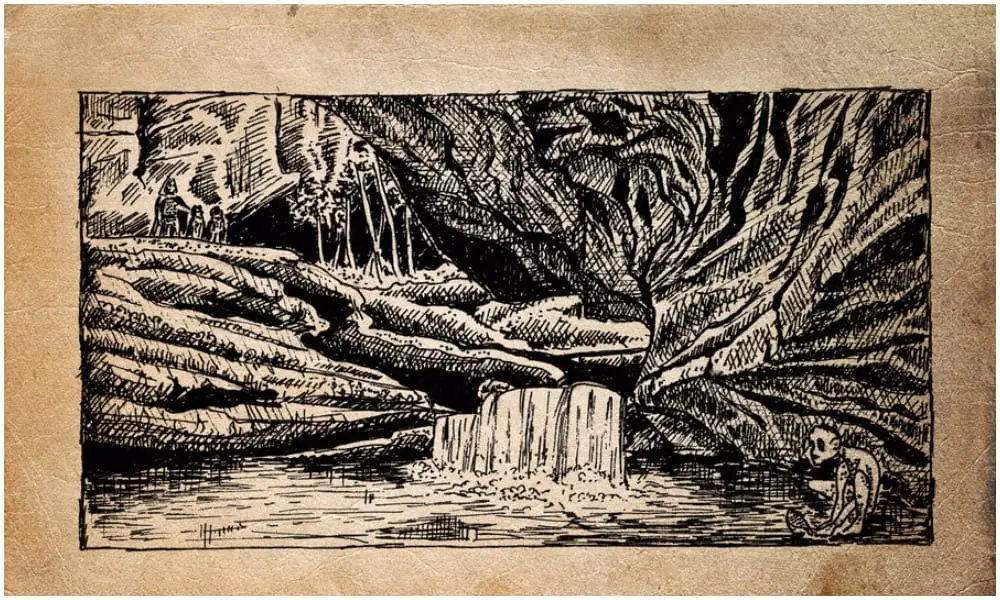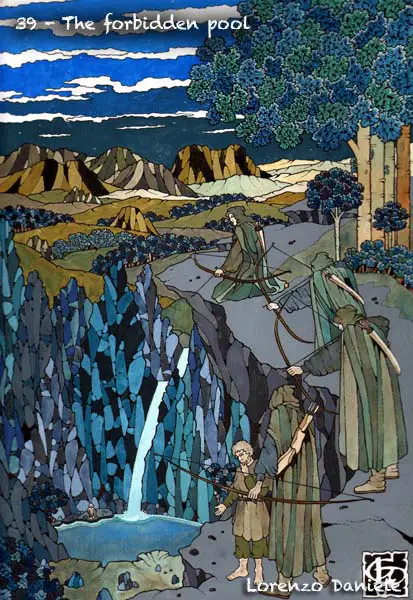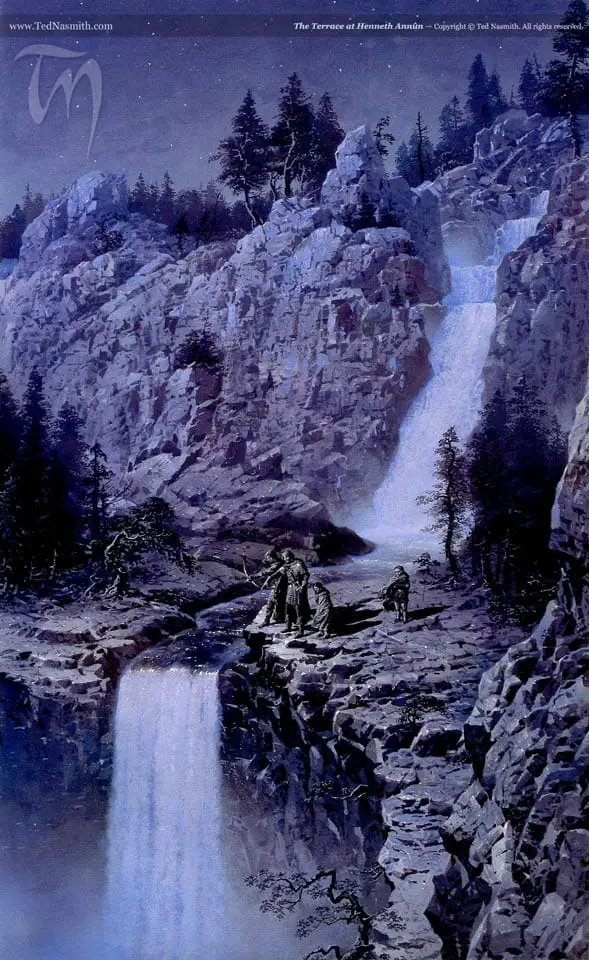“The Window on the West” was a slight deviation from for rest of Book IV of The Lord of the Rings. The view widened, bringing in a broader cast of characters rather than keeping the focus fixed on a close-up of Frodo, Sam, and Gollum. There are explicit discussions of the rest of the Company, and the hobbits get to sleep in a warm bed in a beautiful place, after eating a meal of more than lembas. Gollum is gone. “The Forbidden Pool” treads water, a bit. It pulls Gollum back into the narrative (and gives him another reason to feel jumpy and angry). It makes room for some ominous Cirith Ungol foreshadowing. And it gives Tolkien an excuse to talk about some moon-drenched landscapes and a glimmering pool.
There’s no question that it’s a scene-setting chapter for the upcoming Shelob climax, but there are still some interesting things going on. We get a closer glimpse into Frodo’s internal monologue about Gollum, and we get some worrying hints about Gollum’s current mental state. And these are pulled together in the chapter’s closing conversation between Frodo and Faramir, which raises a host of interesting questions regarding oaths, the limits of protocol, and choice.
Moonset over Gondor
It’s easy to see “The Window on the West” as a highlight chapter for Frodo in The Two Towers. He holds his own in a tough round of questioning by Faramir, he gets food, rest, and – most importantly – a sympathetic ear and ally. But his time overlooking the pool shows how fleeting that moment was, and how it came with its own cost. When Faramir pulls him out onto the platform overlooking the pool, Frodo is not particularly impressed by the beautiful sight. Instead “a shiver ran through him, wondering if anywhere in the vastness of the nightlands his old companions walked or slept, or lay dead shrouded in mist.”
Given the amount of story that has passed in between (and the gap between our knowledge and Frodo’s) it surprised me to remember that Frodo just learned that Boromir – with whom he’d had a fraught, complicated relationship – is dead. And that the rest of the Fellowship, including Merry and Pippin, may be dead too. It takes the sheen off a good night’s sleep and slight respite from the slog towards Mordor.
[Poor Faramir can’t quite read the room, though, and mostly winds up chastising them for not sufficiently enjoying the view over the pool and “fair Ithil” (it’s worth a few shivers, Sam)].

The Forbidden Pool
It is also hard to avoid the idea that Frodo’s slight respite last chapter derived in part from the lack of Gollum (sorry, WanderingUndine). When he returns in this chapter, eating fish and splashing in the pool, we get a look into Frodo’s headspace.
Frodo shivered, listening with pity and disgust. He wished it would stop, and that he never need hear that voice again. Anborn was not far behind. He could creep back and ask him to get the huntsmen to shoot. They would probably get close enough, while Gollum was gorging and off his guard. Only one true shot, and Frodo would be rid of the miserable voice forever. But no, Gollum had a claim on him now. The servant has a claim on the master for service, even service in fear. They would have foundered in the Dead Marshes but for Gollum. Frodo knew, too, somehow, quite clearly, that Gandalf would not have wished it.
Much of Frodo’s treatment of Gollum in the past has been viewed through Sam’s eyes. Here, we see a (relatively) unfiltered look at his thoughts towards Gollum, and it’s interesting that in the end, they really aren’t much different than Sam’s. Both look on the creature with pity and with disgust. Both want him gone. It’s a nice detail to include here, because it really highlights that Frodo’s treatment of Gollum (Sméagol) is about choice. He feels pretty much the same as Sam, but Frodo chooses – using the language of oaths and personal bonds – to maintain a loyalty towards Gollum.
Gollum and Faramir
It makes the next moment in the chapter all the sadder, of course. Because Frodo chooses to maintain Gollum as his “servant,” but in doing so, Gollum processes it as a betrayal. And Frodo knows it: his actions “would seem a treachery to the poor treacherous creature.” It’s understandable from Gollum’s perspective. Frodo and Sam disappeared, went off with a large army of strange men without him. When Frodo reappears at the pool he hands Gollum into the custody of a man who looks like Aragorn, whom Gollum associates only with pain and distrust. It’s no wonder Gollum spits at Frodo when he tries to explain his choice.
It’s a sad moment for Gollum. He’s about to betray one of the few people who has shown him consistent kindness, handing him to a giant spider monster on the doorstep of Mordor. But he’s also in a pitiable position. He’s just been abandoned. He’s just finally found some real food at the pool – for the first time in a while – and he’s told that if he finishes eating it, he’ll be shot. And when his master returns, he feels himself to have been betrayed.
“No name, no business, no Precious, nothing. Only empty. Only hungry: yes, we are hungry. A few little fishes, nasty bony little fishes, for a poor creature, and they say death. So wise they are; so just, so very just.”
It’s nearly impossible not to feel sympathy.
The Limits of Protocol
Frodo’s language of obligation takes on an extra layer of meaning due to his later conversation with Faramir. There is a layer of formality and protocol to their interactions that I don’t really recall being so explicit earlier in The Lord of the Rings.
“Are you answered?”
Frodo bowed low. “I am answered,” he said. “And I place myself at your service, if that is of any worth to one so high and honorable.”
“It is of great worth,” said Faramir. “And now, do you take this creature, this Sméagol, under your protection?”
“I do take Sméagol under my protection.” Sam sighed audibly.
It’s much more formal than much of Tolkien’s dialogue, and both are clearly speaking in a prescribed language with long-standing implications. They’re setting up a series of bonds that tie the three characters together, but that also nearly immediately come into conflict.
Oaths and similar prescribed language evolve to standardize and regulate relationships. You swear an oath to a lord, you both take on a standardized set of obligations and rights. You serve the lord, the lord protects you, so on and so forth. In an ideal world it clarifies relationships, and it makes the world fairer. Of course, in reality, this almost immediately falls apart:
“I have promised many times to take him under my protection and go where he led. You would not ask me to break faith with him?”
“No,” said Faramir. “But my heart would. For it seems less evil to counsel another man to break troth than to do so oneself, especially if one sees a friend bound unwitting to his own harm.”
These bonds immediately come into conflict. Frodo’s promises to Gollum clash with Faramir’s obligations to protect a friend who has entered into his service. And all of it clashes with the reality of Frodo’s quest: it’s a potential impossibility, offering only the options of walking up to the Black Gate or creeping through the “sleepless malice” of Cirith Ungol. Even if that choice is rejected:
“And if I turn back, refusing the road in its bitter end, where then shall I go among Elves or Men? Would you have me come to Gondor with this Thing, the Thing that drove your brother mad with desire? What spell would I work in Minas Tirith? Shall there be two dead cities of Minas Morgul, grinning at each other across a dead land filled with rottenness?”
“I would not have it so,” said Faramir.
“Then what would you have me do?”
“I know not. Only I would not have you go to death or to torment. And I do not think that Mithrandir would have chosen this way.”
“Yet since he is gone, I must take such paths as I can find.”
It’s a deceptively dark way to end the hobbits’ sojourn with Faramir, as the traditional bonds, customs, and obligations of Middle-earth break down in the face of Frodo’s reality. It’s a tonal pivot that paves the way towards the end of the book, and the journey to Cirith Ungol.
Final Comments
- Apologies for a shorter article! It’s midterm grading week.
- The second half of Books II and IV both have ten chapters. “The Forbidden Pool” lines up with “The Mirror of Galadriel,” which is a nice touch. Both are named after water, both involve moral quandaries. Both set the stage for the danger at the end of the book.
- When Faramir asks Frodo why Gollum would follow him to Henneth Annun, Frodo suggests that “he is allured here by a mastering desire, stronger than his caution.” I’m not sure Tolkien intended it to be a joke, but he played me like a fiddle. My first, split-second thought was fish. Then I remembered “oh, no, of course it’s the Ring.” In the end, of course, it’s fish. Oh Gollum, you and your many (two) wants.
- Prose Prize: He lifted his eyes and gazed far away. The world was quiet and cold, as if dawn were near. Far off in the West the pale moon was sinking, round and white. Pale mists shivered in the great vale below: a wide gulf of silver fume, beneath which rolled the cool night-waters of the Anduin. A black darkness loomed beyond, and in it glinted, here and there, cold, sharp, remote, white as the teeth of ghosts, the peaks of Ered Nimrais, the White Mountains of the Realm of Gondor, tipped with everlasting snow.
- Tolkien’s Wanton Cruelty to Innocent Punctuation Marks (sponsored by Mytly): Again, terrible, Tolkien has let me down with his restraint. I can no longer be surprised by sentences under 50 words and with less than four independent clauses.
- Contemporary to this chapter: Aragorn, making a similarly difficult choice about the appropriateness of a dangerous itinerary off to the west, prepares to head into the Paths of the Dead.
Art, in order of appearance, is courtesy of The Lord of the Rings: The Two Towers (2002, New Line Cinema), erzsebet-beast, Lorenzo Daniele, and Ted Nasmith.



